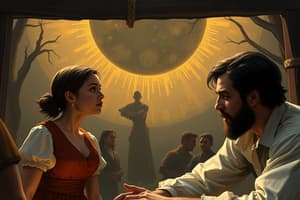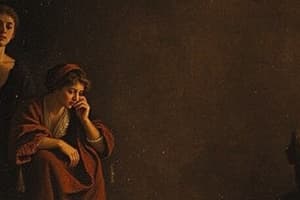Podcast
Questions and Answers
What does Parris refer to when he says, 'Now, look you, Goody Putnam, she never--'?
What does Parris refer to when he says, 'Now, look you, Goody Putnam, she never--'?
What does Putnam claim is a sign of witchcraft?
What does Putnam claim is a sign of witchcraft?
That is a notorious sign of witchcraft afoot.
Putnam believes there are no hurtful, vengeful spirits affecting the children.
Putnam believes there are no hurtful, vengeful spirits affecting the children.
False (B)
Putnam claims that there is a __________ witch among them.
Putnam claims that there is a __________ witch among them.
Signup and view all the answers
What does Putnam urge Parris to do?
What does Putnam urge Parris to do?
Signup and view all the answers
What does Parris fear will happen to him?
What does Parris fear will happen to him?
Signup and view all the answers
Putnam agrees with Proctor that they vote by acreage in their society.
Putnam agrees with Proctor that they vote by acreage in their society.
Signup and view all the answers
What does Putnam say about his remaining child?
What does Putnam say about his remaining child?
Signup and view all the answers
What does Putnam want Reverend Hale to do?
What does Putnam want Reverend Hale to do?
Signup and view all the answers
Who does Putnam accuse of prompting his daughter to cry witchery?
Who does Putnam accuse of prompting his daughter to cry witchery?
Signup and view all the answers
Putnam believes that every meeting is necessary.
Putnam believes that every meeting is necessary.
Signup and view all the answers
Study Notes
Mr. Thomas Putnam's Character in "The Crucible"
- Putnam reveals his opportunistic nature in discussing witchcraft, seeing it as a means to gain power and influence in the community.
- Believes that revealing witchcraft is a divine providence, indicating a strong belief in the supernatural.
- Insists there are “vengeful spirits” harming the children, suggesting a deep-seated fear and paranoia that fuels the witch hunt.
Interactions with Other Characters
- Has a contentious relationship with Parris, often challenging the minister’s authority and decisions.
- Pressures Parris to recognize the existence of witchcraft actively, emphasizing his willingness to accuse others for his gain.
- Uses the emotional turmoil of his wife, Ann, to manipulate the situation further, highlighting the importance of family ties in the hysteria.
Statements on Witchcraft
- Claims that witchcraft is to blame for the ailments afflicting children, positioning himself as a concerned father.
- Obsessed with signs of witchcraft, he views incidents like the inability to hear the Lord's name as clear evidence of witchery.
- Displays a lack of patience regarding meetings and discussions about witchcraft, indicating exhaustion over the situation's severity.
Personal Grief and Motivation
- Personal tragedy shapes his character; he has lost seven children, fueling his desperation and irrational behavior during the trials.
- Asserts that he has been wronged by society, leading to a broader sense of grievance that manifests through accusations and suspicion of others.
Influence and Authority
- Demonstrates a desire to control the narrative surrounding witchcraft by urging proactive measures against alleged witches.
- Accuses Proctor of hypocrisy regarding community involvement, suggesting he is more committed to the cause than his neighbors.
- Protects his own interests by calling for the witch trials, which he sees as beneficial for eliminating competition and settling personal scores.
Conflict and Confrontation
- Engages in conflict with Giles Corey, showcasing underlying tensions between landowners and those less wealthy amid the trials.
- Involved in legal accusations against others like George Jacobs, illustrating his manipulative strategies to achieve his goals.
Final Observations
- Exhibits contempt for anyone who questions the witch hunt, showing an intolerance for dissenting opinions, reflecting the oppressive atmosphere of Salem.
- His unwavering conviction in the existence of witchcraft and the resulting hysteria reveals how individual grief can transform into collective paranoia and violence.
Studying That Suits You
Use AI to generate personalized quizzes and flashcards to suit your learning preferences.
Description
Dive into the character of Mr. Thomas Putnam from Arthur Miller's 'The Crucible' through these flashcards. Each card provides key lines and definitions that illuminate Putnam's role and perspectives within the play. Perfect for students studying this classic work of literature.




